Unit 9: Entrepreneurship and Small Business Management Analysis Report
VerifiedAdded on 2023/01/13
|21
|5171
|21
Report
AI Summary
This report, focusing on Unit 9 of an Entrepreneurship and Small Business Management module, explores various types of entrepreneurial ventures, including social, scalable, large company, and small business models. It examines the similarities and differences between these ventures, providing examples such as Tesco and Cocoon. The report delves into the impact of micro and small businesses on the UK economy, highlighting their contribution to employment and GDP. It also discusses the characteristics, traits, and skills of successful entrepreneurs and how their personalities influence motivation and mindset. Furthermore, it analyzes how an entrepreneur's background and experience can either hinder or foster their decision-making processes. The report offers insights into survival, high-growth, high-tech, and social firms and their relation to different entrepreneurial typologies. Key aspects such as the contribution of micro and small businesses to the UK economy, including employment generation and ethical considerations, are also discussed. The report provides a comprehensive overview of the subject matter, including detailed statistical data and real-world examples to illustrate the concepts discussed.

Unit 9 - Entrepreneurship
and Small Business
Management
and Small Business
Management
Paraphrase This Document
Need a fresh take? Get an instant paraphrase of this document with our AI Paraphraser

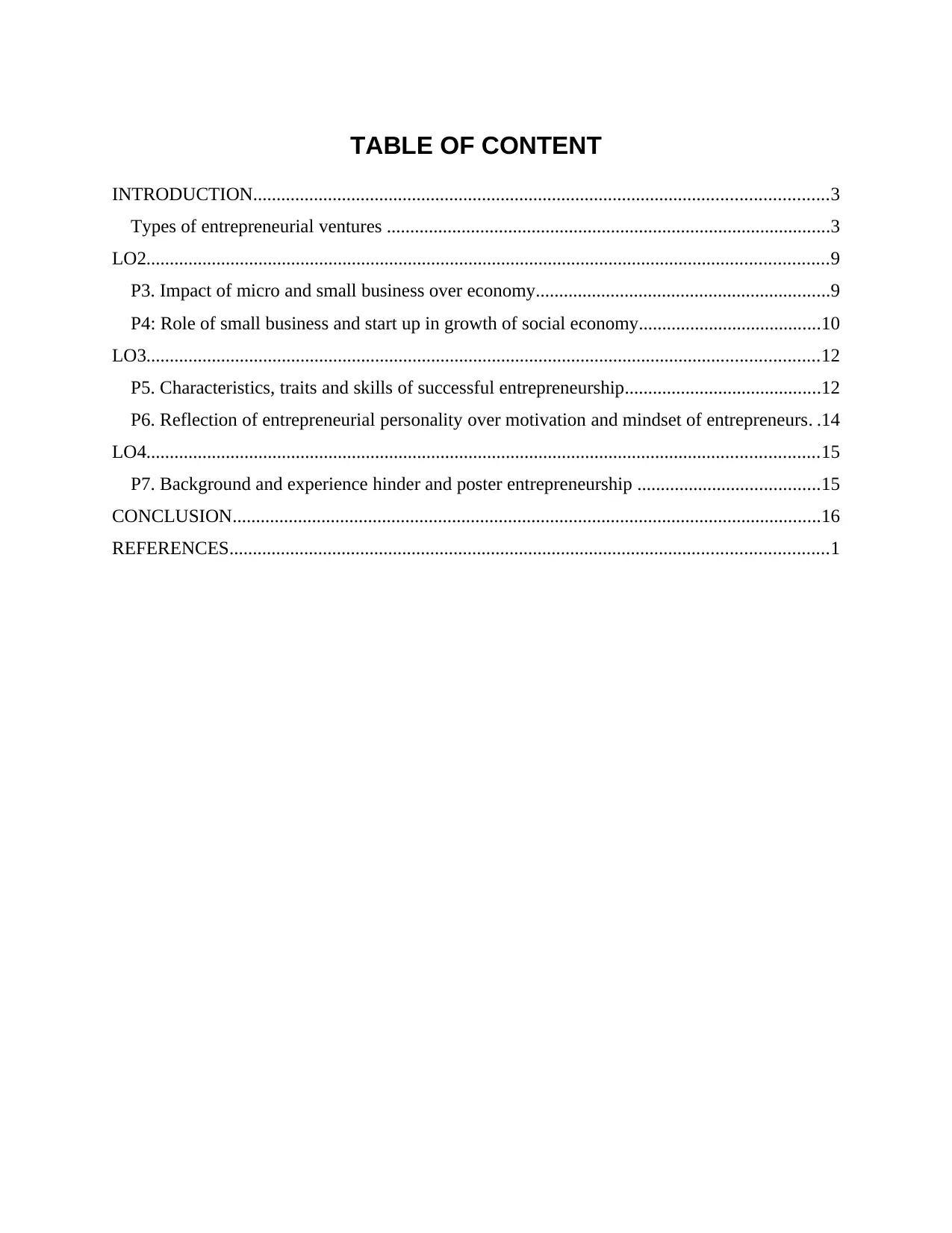
TABLE OF CONTENT
INTRODUCTION...........................................................................................................................3
Types of entrepreneurial ventures ...............................................................................................3
LO2..................................................................................................................................................9
P3. Impact of micro and small business over economy...............................................................9
P4: Role of small business and start up in growth of social economy.......................................10
LO3................................................................................................................................................12
P5. Characteristics, traits and skills of successful entrepreneurship..........................................12
P6. Reflection of entrepreneurial personality over motivation and mindset of entrepreneurs. .14
LO4................................................................................................................................................15
P7. Background and experience hinder and poster entrepreneurship .......................................15
CONCLUSION..............................................................................................................................16
REFERENCES................................................................................................................................1
INTRODUCTION...........................................................................................................................3
Types of entrepreneurial ventures ...............................................................................................3
LO2..................................................................................................................................................9
P3. Impact of micro and small business over economy...............................................................9
P4: Role of small business and start up in growth of social economy.......................................10
LO3................................................................................................................................................12
P5. Characteristics, traits and skills of successful entrepreneurship..........................................12
P6. Reflection of entrepreneurial personality over motivation and mindset of entrepreneurs. .14
LO4................................................................................................................................................15
P7. Background and experience hinder and poster entrepreneurship .......................................15
CONCLUSION..............................................................................................................................16
REFERENCES................................................................................................................................1
⊘ This is a preview!⊘
Do you want full access?
Subscribe today to unlock all pages.

Trusted by 1+ million students worldwide
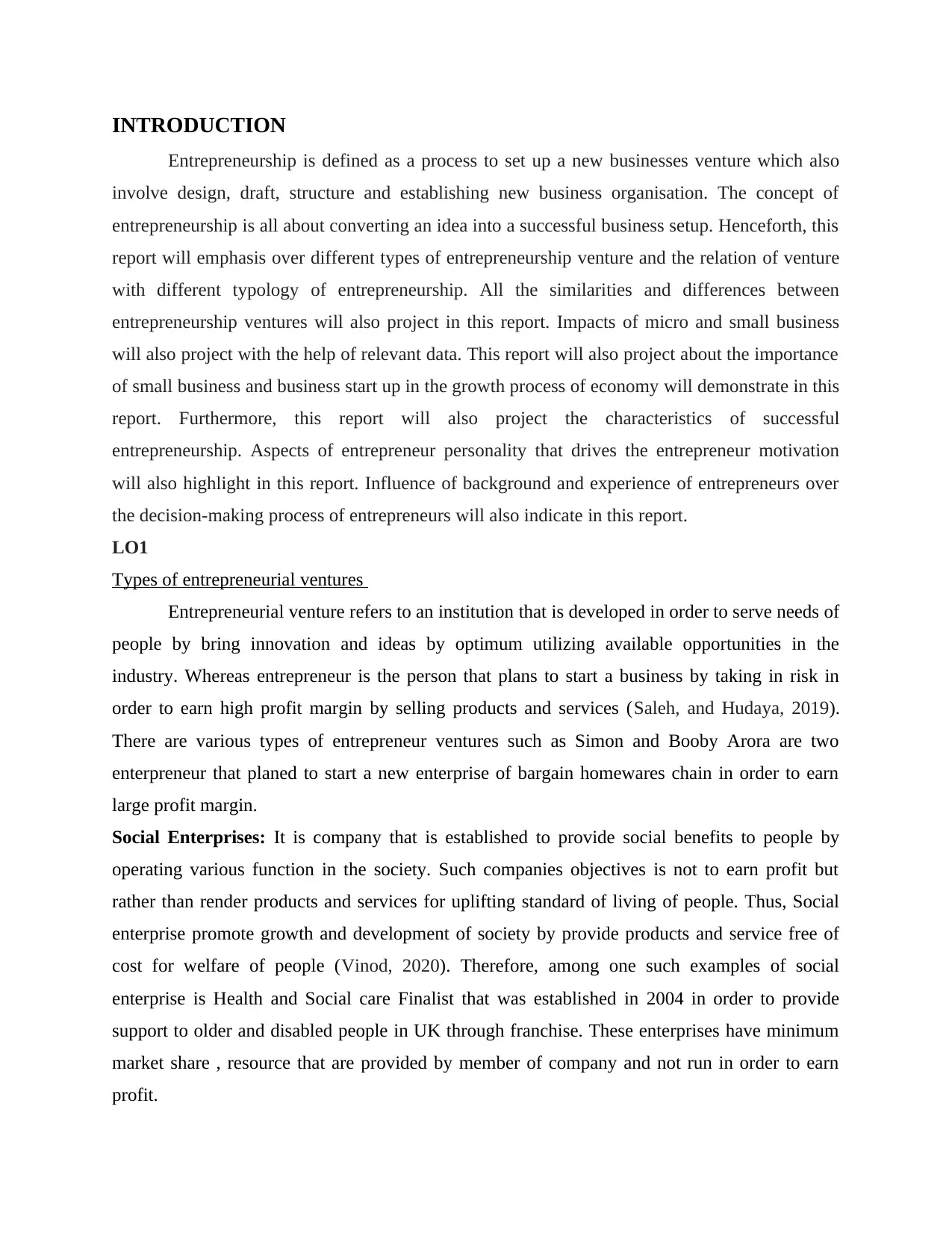
INTRODUCTION
Entrepreneurship is defined as a process to set up a new businesses venture which also
involve design, draft, structure and establishing new business organisation. The concept of
entrepreneurship is all about converting an idea into a successful business setup. Henceforth, this
report will emphasis over different types of entrepreneurship venture and the relation of venture
with different typology of entrepreneurship. All the similarities and differences between
entrepreneurship ventures will also project in this report. Impacts of micro and small business
will also project with the help of relevant data. This report will also project about the importance
of small business and business start up in the growth process of economy will demonstrate in this
report. Furthermore, this report will also project the characteristics of successful
entrepreneurship. Aspects of entrepreneur personality that drives the entrepreneur motivation
will also highlight in this report. Influence of background and experience of entrepreneurs over
the decision-making process of entrepreneurs will also indicate in this report.
LO1
Types of entrepreneurial ventures
Entrepreneurial venture refers to an institution that is developed in order to serve needs of
people by bring innovation and ideas by optimum utilizing available opportunities in the
industry. Whereas entrepreneur is the person that plans to start a business by taking in risk in
order to earn high profit margin by selling products and services (Saleh, and Hudaya, 2019).
There are various types of entrepreneur ventures such as Simon and Booby Arora are two
enterpreneur that planed to start a new enterprise of bargain homewares chain in order to earn
large profit margin.
Social Enterprises: It is company that is established to provide social benefits to people by
operating various function in the society. Such companies objectives is not to earn profit but
rather than render products and services for uplifting standard of living of people. Thus, Social
enterprise promote growth and development of society by provide products and service free of
cost for welfare of people (Vinod, 2020). Therefore, among one such examples of social
enterprise is Health and Social care Finalist that was established in 2004 in order to provide
support to older and disabled people in UK through franchise. These enterprises have minimum
market share , resource that are provided by member of company and not run in order to earn
profit.
Entrepreneurship is defined as a process to set up a new businesses venture which also
involve design, draft, structure and establishing new business organisation. The concept of
entrepreneurship is all about converting an idea into a successful business setup. Henceforth, this
report will emphasis over different types of entrepreneurship venture and the relation of venture
with different typology of entrepreneurship. All the similarities and differences between
entrepreneurship ventures will also project in this report. Impacts of micro and small business
will also project with the help of relevant data. This report will also project about the importance
of small business and business start up in the growth process of economy will demonstrate in this
report. Furthermore, this report will also project the characteristics of successful
entrepreneurship. Aspects of entrepreneur personality that drives the entrepreneur motivation
will also highlight in this report. Influence of background and experience of entrepreneurs over
the decision-making process of entrepreneurs will also indicate in this report.
LO1
Types of entrepreneurial ventures
Entrepreneurial venture refers to an institution that is developed in order to serve needs of
people by bring innovation and ideas by optimum utilizing available opportunities in the
industry. Whereas entrepreneur is the person that plans to start a business by taking in risk in
order to earn high profit margin by selling products and services (Saleh, and Hudaya, 2019).
There are various types of entrepreneur ventures such as Simon and Booby Arora are two
enterpreneur that planed to start a new enterprise of bargain homewares chain in order to earn
large profit margin.
Social Enterprises: It is company that is established to provide social benefits to people by
operating various function in the society. Such companies objectives is not to earn profit but
rather than render products and services for uplifting standard of living of people. Thus, Social
enterprise promote growth and development of society by provide products and service free of
cost for welfare of people (Vinod, 2020). Therefore, among one such examples of social
enterprise is Health and Social care Finalist that was established in 2004 in order to provide
support to older and disabled people in UK through franchise. These enterprises have minimum
market share , resource that are provided by member of company and not run in order to earn
profit.
Paraphrase This Document
Need a fresh take? Get an instant paraphrase of this document with our AI Paraphraser
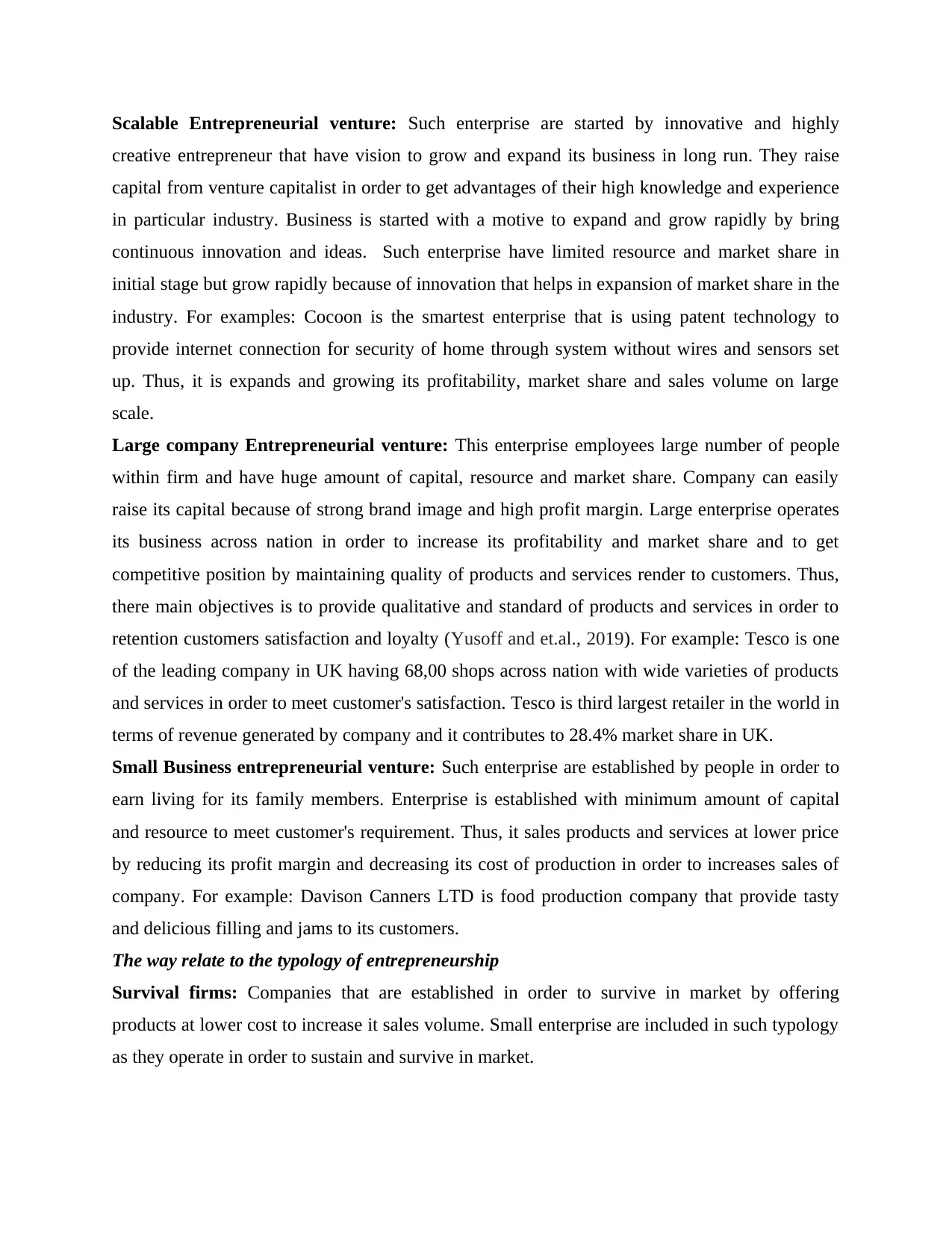
Scalable Entrepreneurial venture: Such enterprise are started by innovative and highly
creative entrepreneur that have vision to grow and expand its business in long run. They raise
capital from venture capitalist in order to get advantages of their high knowledge and experience
in particular industry. Business is started with a motive to expand and grow rapidly by bring
continuous innovation and ideas. Such enterprise have limited resource and market share in
initial stage but grow rapidly because of innovation that helps in expansion of market share in the
industry. For examples: Cocoon is the smartest enterprise that is using patent technology to
provide internet connection for security of home through system without wires and sensors set
up. Thus, it is expands and growing its profitability, market share and sales volume on large
scale.
Large company Entrepreneurial venture: This enterprise employees large number of people
within firm and have huge amount of capital, resource and market share. Company can easily
raise its capital because of strong brand image and high profit margin. Large enterprise operates
its business across nation in order to increase its profitability and market share and to get
competitive position by maintaining quality of products and services render to customers. Thus,
there main objectives is to provide qualitative and standard of products and services in order to
retention customers satisfaction and loyalty (Yusoff and et.al., 2019). For example: Tesco is one
of the leading company in UK having 68,00 shops across nation with wide varieties of products
and services in order to meet customer's satisfaction. Tesco is third largest retailer in the world in
terms of revenue generated by company and it contributes to 28.4% market share in UK.
Small Business entrepreneurial venture: Such enterprise are established by people in order to
earn living for its family members. Enterprise is established with minimum amount of capital
and resource to meet customer's requirement. Thus, it sales products and services at lower price
by reducing its profit margin and decreasing its cost of production in order to increases sales of
company. For example: Davison Canners LTD is food production company that provide tasty
and delicious filling and jams to its customers.
The way relate to the typology of entrepreneurship
Survival firms: Companies that are established in order to survive in market by offering
products at lower cost to increase it sales volume. Small enterprise are included in such typology
as they operate in order to sustain and survive in market.
creative entrepreneur that have vision to grow and expand its business in long run. They raise
capital from venture capitalist in order to get advantages of their high knowledge and experience
in particular industry. Business is started with a motive to expand and grow rapidly by bring
continuous innovation and ideas. Such enterprise have limited resource and market share in
initial stage but grow rapidly because of innovation that helps in expansion of market share in the
industry. For examples: Cocoon is the smartest enterprise that is using patent technology to
provide internet connection for security of home through system without wires and sensors set
up. Thus, it is expands and growing its profitability, market share and sales volume on large
scale.
Large company Entrepreneurial venture: This enterprise employees large number of people
within firm and have huge amount of capital, resource and market share. Company can easily
raise its capital because of strong brand image and high profit margin. Large enterprise operates
its business across nation in order to increase its profitability and market share and to get
competitive position by maintaining quality of products and services render to customers. Thus,
there main objectives is to provide qualitative and standard of products and services in order to
retention customers satisfaction and loyalty (Yusoff and et.al., 2019). For example: Tesco is one
of the leading company in UK having 68,00 shops across nation with wide varieties of products
and services in order to meet customer's satisfaction. Tesco is third largest retailer in the world in
terms of revenue generated by company and it contributes to 28.4% market share in UK.
Small Business entrepreneurial venture: Such enterprise are established by people in order to
earn living for its family members. Enterprise is established with minimum amount of capital
and resource to meet customer's requirement. Thus, it sales products and services at lower price
by reducing its profit margin and decreasing its cost of production in order to increases sales of
company. For example: Davison Canners LTD is food production company that provide tasty
and delicious filling and jams to its customers.
The way relate to the typology of entrepreneurship
Survival firms: Companies that are established in order to survive in market by offering
products at lower cost to increase it sales volume. Small enterprise are included in such typology
as they operate in order to sustain and survive in market.
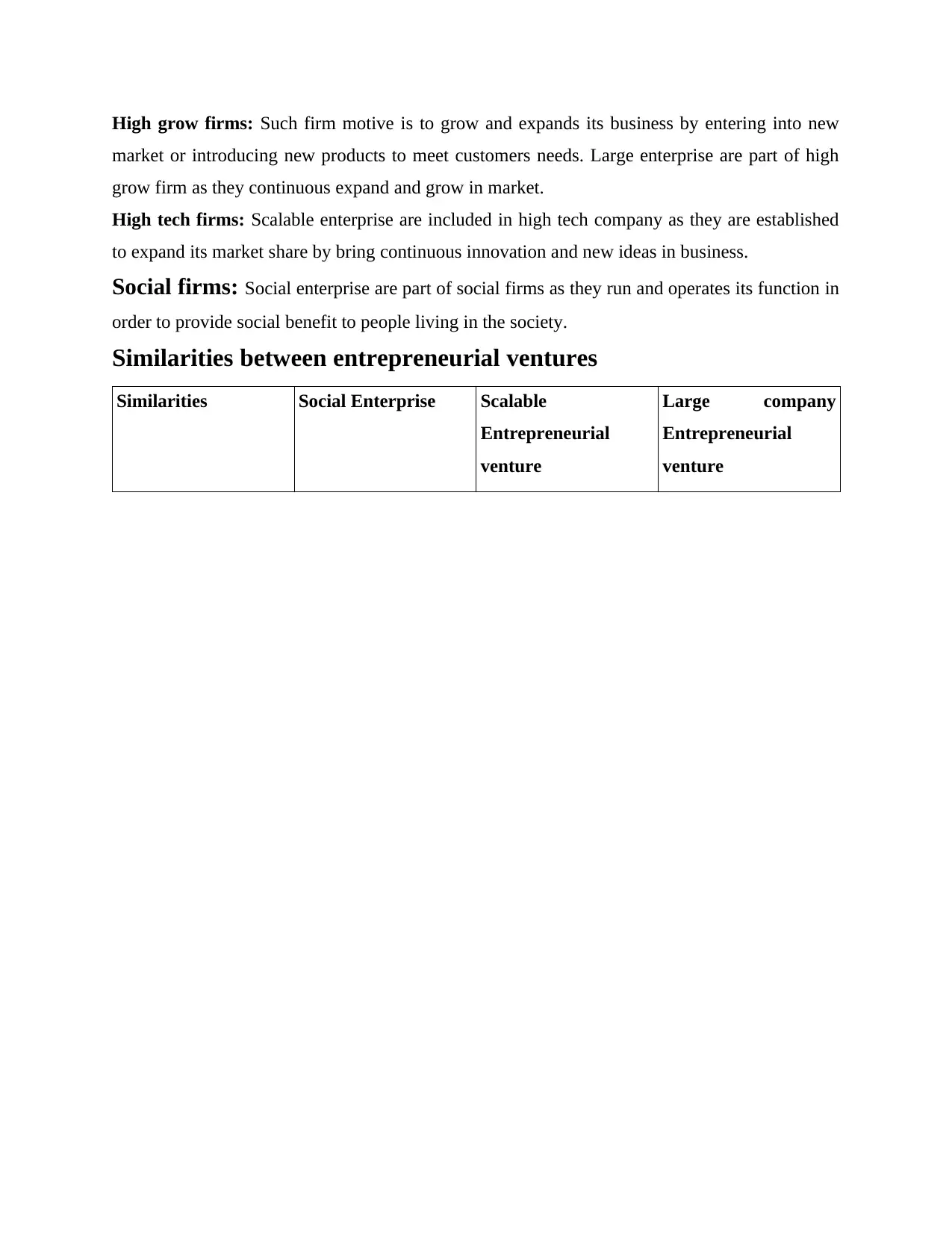
High grow firms: Such firm motive is to grow and expands its business by entering into new
market or introducing new products to meet customers needs. Large enterprise are part of high
grow firm as they continuous expand and grow in market.
High tech firms: Scalable enterprise are included in high tech company as they are established
to expand its market share by bring continuous innovation and new ideas in business.
Social firms: Social enterprise are part of social firms as they run and operates its function in
order to provide social benefit to people living in the society.
Similarities between entrepreneurial ventures
Similarities Social Enterprise Scalable
Entrepreneurial
venture
Large company
Entrepreneurial
venture
market or introducing new products to meet customers needs. Large enterprise are part of high
grow firm as they continuous expand and grow in market.
High tech firms: Scalable enterprise are included in high tech company as they are established
to expand its market share by bring continuous innovation and new ideas in business.
Social firms: Social enterprise are part of social firms as they run and operates its function in
order to provide social benefit to people living in the society.
Similarities between entrepreneurial ventures
Similarities Social Enterprise Scalable
Entrepreneurial
venture
Large company
Entrepreneurial
venture
⊘ This is a preview!⊘
Do you want full access?
Subscribe today to unlock all pages.

Trusted by 1+ million students worldwide
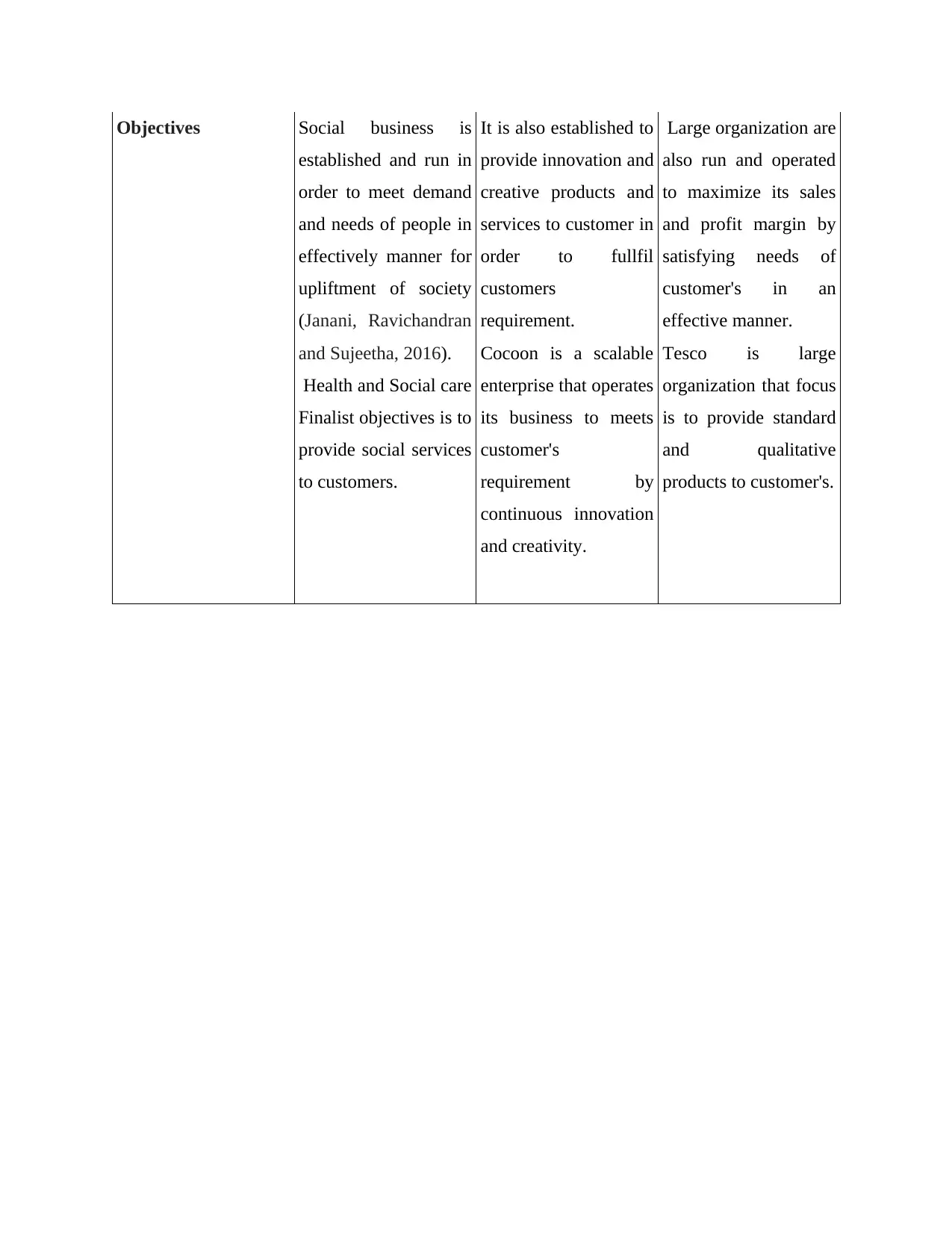
Objectives Social business is
established and run in
order to meet demand
and needs of people in
effectively manner for
upliftment of society
(Janani, Ravichandran
and Sujeetha, 2016).
Health and Social care
Finalist objectives is to
provide social services
to customers.
It is also established to
provide innovation and
creative products and
services to customer in
order to fullfil
customers
requirement.
Cocoon is a scalable
enterprise that operates
its business to meets
customer's
requirement by
continuous innovation
and creativity.
Large organization are
also run and operated
to maximize its sales
and profit margin by
satisfying needs of
customer's in an
effective manner.
Tesco is large
organization that focus
is to provide standard
and qualitative
products to customer's.
established and run in
order to meet demand
and needs of people in
effectively manner for
upliftment of society
(Janani, Ravichandran
and Sujeetha, 2016).
Health and Social care
Finalist objectives is to
provide social services
to customers.
It is also established to
provide innovation and
creative products and
services to customer in
order to fullfil
customers
requirement.
Cocoon is a scalable
enterprise that operates
its business to meets
customer's
requirement by
continuous innovation
and creativity.
Large organization are
also run and operated
to maximize its sales
and profit margin by
satisfying needs of
customer's in an
effective manner.
Tesco is large
organization that focus
is to provide standard
and qualitative
products to customer's.
Paraphrase This Document
Need a fresh take? Get an instant paraphrase of this document with our AI Paraphraser
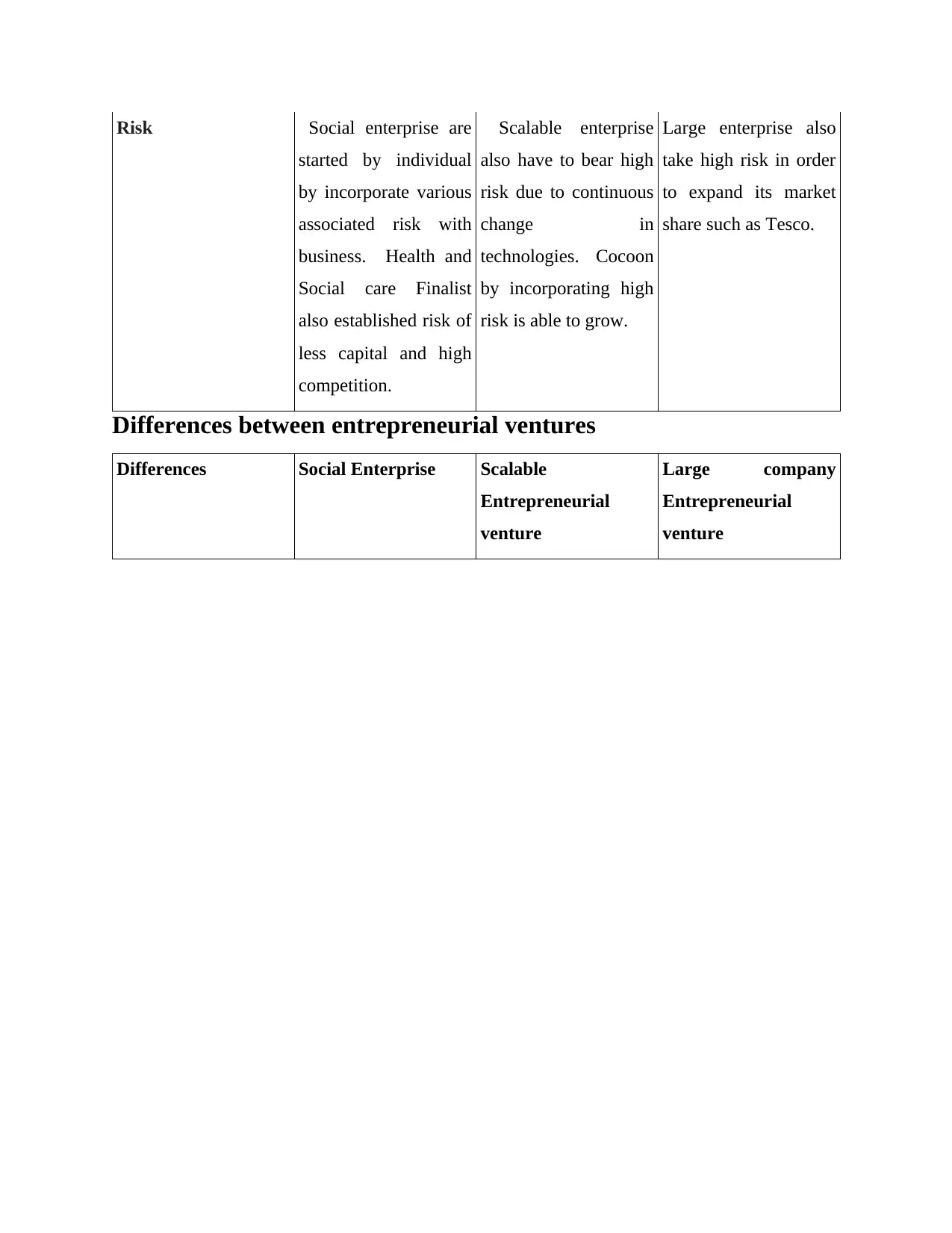
Risk Social enterprise are
started by individual
by incorporate various
associated risk with
business. Health and
Social care Finalist
also established risk of
less capital and high
competition.
Scalable enterprise
also have to bear high
risk due to continuous
change in
technologies. Cocoon
by incorporating high
risk is able to grow.
Large enterprise also
take high risk in order
to expand its market
share such as Tesco.
Differences between entrepreneurial ventures
Differences Social Enterprise Scalable
Entrepreneurial
venture
Large company
Entrepreneurial
venture
started by individual
by incorporate various
associated risk with
business. Health and
Social care Finalist
also established risk of
less capital and high
competition.
Scalable enterprise
also have to bear high
risk due to continuous
change in
technologies. Cocoon
by incorporating high
risk is able to grow.
Large enterprise also
take high risk in order
to expand its market
share such as Tesco.
Differences between entrepreneurial ventures
Differences Social Enterprise Scalable
Entrepreneurial
venture
Large company
Entrepreneurial
venture
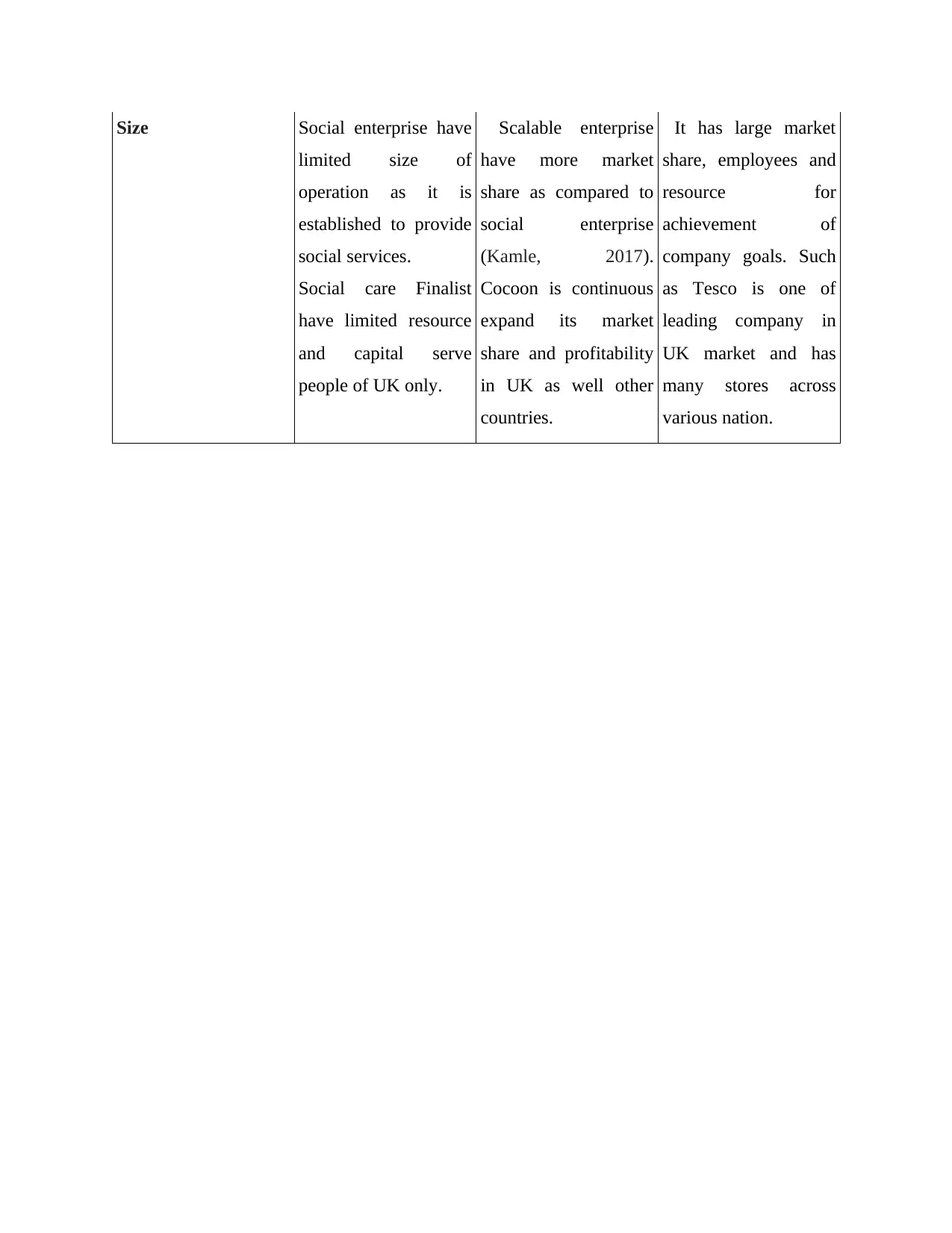
Size Social enterprise have
limited size of
operation as it is
established to provide
social services.
Social care Finalist
have limited resource
and capital serve
people of UK only.
Scalable enterprise
have more market
share as compared to
social enterprise
(Kamle, 2017).
Cocoon is continuous
expand its market
share and profitability
in UK as well other
countries.
It has large market
share, employees and
resource for
achievement of
company goals. Such
as Tesco is one of
leading company in
UK market and has
many stores across
various nation.
limited size of
operation as it is
established to provide
social services.
Social care Finalist
have limited resource
and capital serve
people of UK only.
Scalable enterprise
have more market
share as compared to
social enterprise
(Kamle, 2017).
Cocoon is continuous
expand its market
share and profitability
in UK as well other
countries.
It has large market
share, employees and
resource for
achievement of
company goals. Such
as Tesco is one of
leading company in
UK market and has
many stores across
various nation.
⊘ This is a preview!⊘
Do you want full access?
Subscribe today to unlock all pages.

Trusted by 1+ million students worldwide
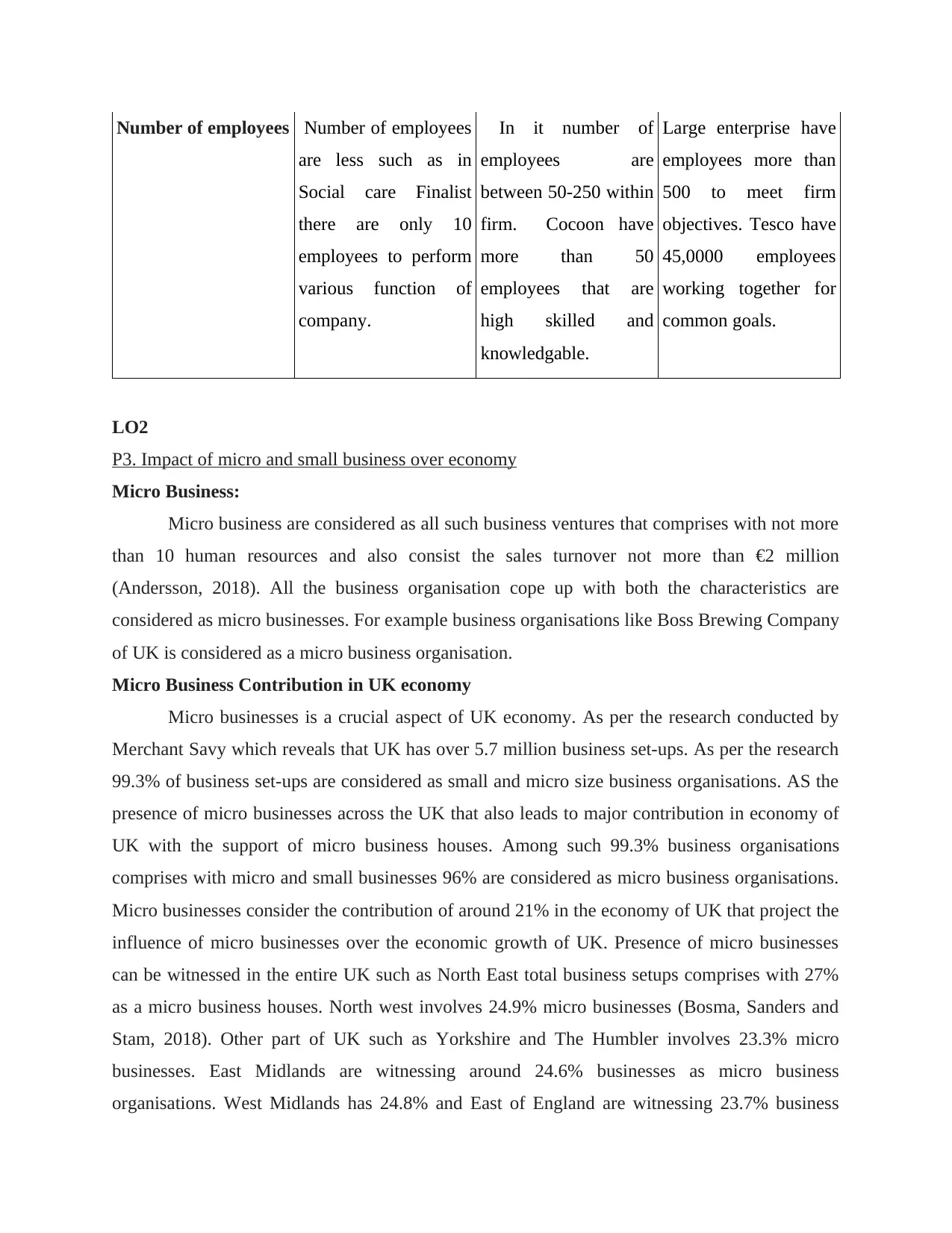
Number of employees Number of employees
are less such as in
Social care Finalist
there are only 10
employees to perform
various function of
company.
In it number of
employees are
between 50-250 within
firm. Cocoon have
more than 50
employees that are
high skilled and
knowledgable.
Large enterprise have
employees more than
500 to meet firm
objectives. Tesco have
45,0000 employees
working together for
common goals.
LO2
P3. Impact of micro and small business over economy
Micro Business:
Micro business are considered as all such business ventures that comprises with not more
than 10 human resources and also consist the sales turnover not more than €2 million
(Andersson, 2018). All the business organisation cope up with both the characteristics are
considered as micro businesses. For example business organisations like Boss Brewing Company
of UK is considered as a micro business organisation.
Micro Business Contribution in UK economy
Micro businesses is a crucial aspect of UK economy. As per the research conducted by
Merchant Savy which reveals that UK has over 5.7 million business set-ups. As per the research
99.3% of business set-ups are considered as small and micro size business organisations. AS the
presence of micro businesses across the UK that also leads to major contribution in economy of
UK with the support of micro business houses. Among such 99.3% business organisations
comprises with micro and small businesses 96% are considered as micro business organisations.
Micro businesses consider the contribution of around 21% in the economy of UK that project the
influence of micro businesses over the economic growth of UK. Presence of micro businesses
can be witnessed in the entire UK such as North East total business setups comprises with 27%
as a micro business houses. North west involves 24.9% micro businesses (Bosma, Sanders and
Stam, 2018). Other part of UK such as Yorkshire and The Humbler involves 23.3% micro
businesses. East Midlands are witnessing around 24.6% businesses as micro business
organisations. West Midlands has 24.8% and East of England are witnessing 23.7% business
are less such as in
Social care Finalist
there are only 10
employees to perform
various function of
company.
In it number of
employees are
between 50-250 within
firm. Cocoon have
more than 50
employees that are
high skilled and
knowledgable.
Large enterprise have
employees more than
500 to meet firm
objectives. Tesco have
45,0000 employees
working together for
common goals.
LO2
P3. Impact of micro and small business over economy
Micro Business:
Micro business are considered as all such business ventures that comprises with not more
than 10 human resources and also consist the sales turnover not more than €2 million
(Andersson, 2018). All the business organisation cope up with both the characteristics are
considered as micro businesses. For example business organisations like Boss Brewing Company
of UK is considered as a micro business organisation.
Micro Business Contribution in UK economy
Micro businesses is a crucial aspect of UK economy. As per the research conducted by
Merchant Savy which reveals that UK has over 5.7 million business set-ups. As per the research
99.3% of business set-ups are considered as small and micro size business organisations. AS the
presence of micro businesses across the UK that also leads to major contribution in economy of
UK with the support of micro business houses. Among such 99.3% business organisations
comprises with micro and small businesses 96% are considered as micro business organisations.
Micro businesses consider the contribution of around 21% in the economy of UK that project the
influence of micro businesses over the economic growth of UK. Presence of micro businesses
can be witnessed in the entire UK such as North East total business setups comprises with 27%
as a micro business houses. North west involves 24.9% micro businesses (Bosma, Sanders and
Stam, 2018). Other part of UK such as Yorkshire and The Humbler involves 23.3% micro
businesses. East Midlands are witnessing around 24.6% businesses as micro business
organisations. West Midlands has 24.8% and East of England are witnessing 23.7% business
Paraphrase This Document
Need a fresh take? Get an instant paraphrase of this document with our AI Paraphraser
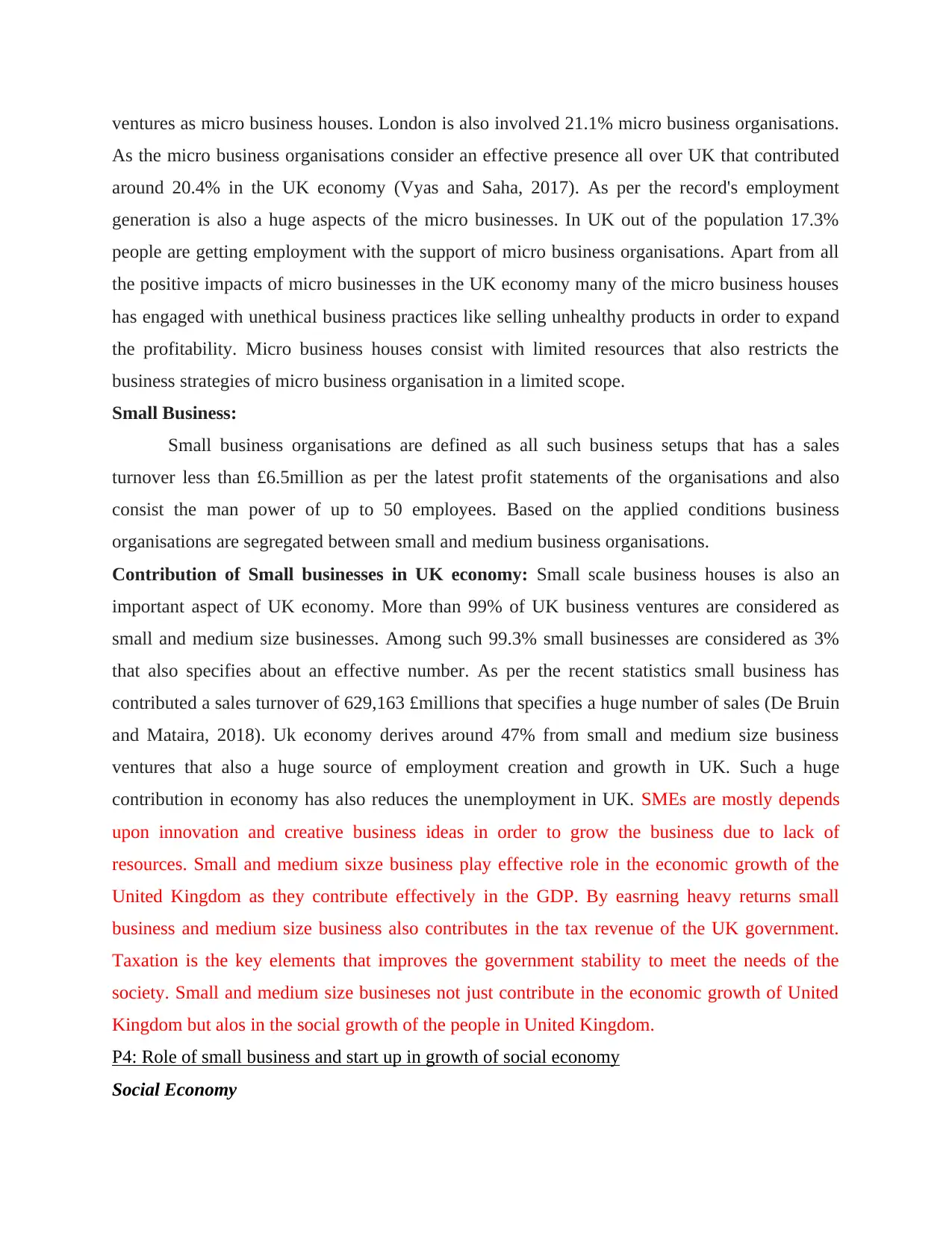
ventures as micro business houses. London is also involved 21.1% micro business organisations.
As the micro business organisations consider an effective presence all over UK that contributed
around 20.4% in the UK economy (Vyas and Saha, 2017). As per the record's employment
generation is also a huge aspects of the micro businesses. In UK out of the population 17.3%
people are getting employment with the support of micro business organisations. Apart from all
the positive impacts of micro businesses in the UK economy many of the micro business houses
has engaged with unethical business practices like selling unhealthy products in order to expand
the profitability. Micro business houses consist with limited resources that also restricts the
business strategies of micro business organisation in a limited scope.
Small Business:
Small business organisations are defined as all such business setups that has a sales
turnover less than £6.5million as per the latest profit statements of the organisations and also
consist the man power of up to 50 employees. Based on the applied conditions business
organisations are segregated between small and medium business organisations.
Contribution of Small businesses in UK economy: Small scale business houses is also an
important aspect of UK economy. More than 99% of UK business ventures are considered as
small and medium size businesses. Among such 99.3% small businesses are considered as 3%
that also specifies about an effective number. As per the recent statistics small business has
contributed a sales turnover of 629,163 £millions that specifies a huge number of sales (De Bruin
and Mataira, 2018). Uk economy derives around 47% from small and medium size business
ventures that also a huge source of employment creation and growth in UK. Such a huge
contribution in economy has also reduces the unemployment in UK. SMEs are mostly depends
upon innovation and creative business ideas in order to grow the business due to lack of
resources. Small and medium sixze business play effective role in the economic growth of the
United Kingdom as they contribute effectively in the GDP. By easrning heavy returns small
business and medium size business also contributes in the tax revenue of the UK government.
Taxation is the key elements that improves the government stability to meet the needs of the
society. Small and medium size busineses not just contribute in the economic growth of United
Kingdom but alos in the social growth of the people in United Kingdom.
P4: Role of small business and start up in growth of social economy
Social Economy
As the micro business organisations consider an effective presence all over UK that contributed
around 20.4% in the UK economy (Vyas and Saha, 2017). As per the record's employment
generation is also a huge aspects of the micro businesses. In UK out of the population 17.3%
people are getting employment with the support of micro business organisations. Apart from all
the positive impacts of micro businesses in the UK economy many of the micro business houses
has engaged with unethical business practices like selling unhealthy products in order to expand
the profitability. Micro business houses consist with limited resources that also restricts the
business strategies of micro business organisation in a limited scope.
Small Business:
Small business organisations are defined as all such business setups that has a sales
turnover less than £6.5million as per the latest profit statements of the organisations and also
consist the man power of up to 50 employees. Based on the applied conditions business
organisations are segregated between small and medium business organisations.
Contribution of Small businesses in UK economy: Small scale business houses is also an
important aspect of UK economy. More than 99% of UK business ventures are considered as
small and medium size businesses. Among such 99.3% small businesses are considered as 3%
that also specifies about an effective number. As per the recent statistics small business has
contributed a sales turnover of 629,163 £millions that specifies a huge number of sales (De Bruin
and Mataira, 2018). Uk economy derives around 47% from small and medium size business
ventures that also a huge source of employment creation and growth in UK. Such a huge
contribution in economy has also reduces the unemployment in UK. SMEs are mostly depends
upon innovation and creative business ideas in order to grow the business due to lack of
resources. Small and medium sixze business play effective role in the economic growth of the
United Kingdom as they contribute effectively in the GDP. By easrning heavy returns small
business and medium size business also contributes in the tax revenue of the UK government.
Taxation is the key elements that improves the government stability to meet the needs of the
society. Small and medium size busineses not just contribute in the economic growth of United
Kingdom but alos in the social growth of the people in United Kingdom.
P4: Role of small business and start up in growth of social economy
Social Economy
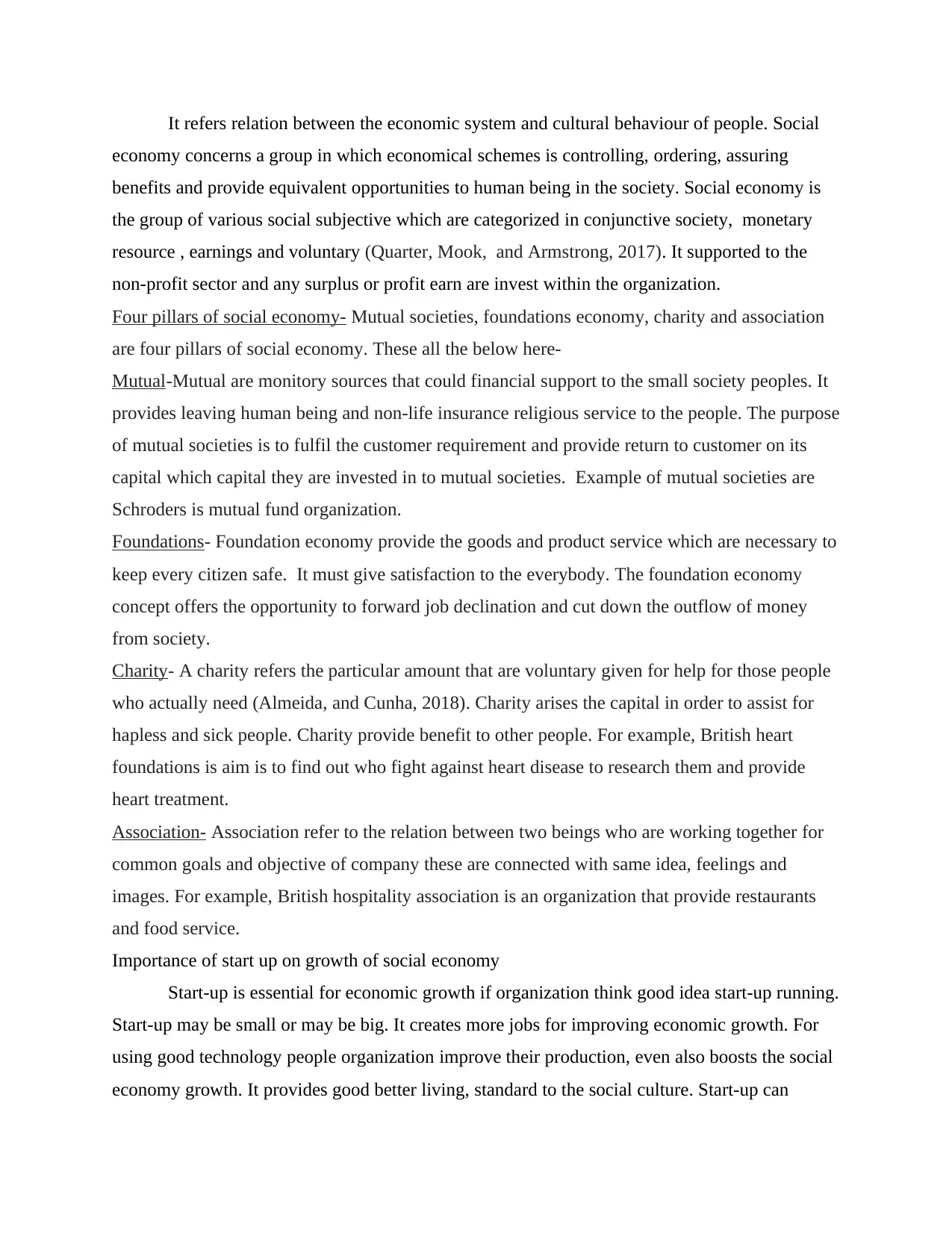
It refers relation between the economic system and cultural behaviour of people. Social
economy concerns a group in which economical schemes is controlling, ordering, assuring
benefits and provide equivalent opportunities to human being in the society. Social economy is
the group of various social subjective which are categorized in conjunctive society, monetary
resource , earnings and voluntary (Quarter, Mook, and Armstrong, 2017). It supported to the
non-profit sector and any surplus or profit earn are invest within the organization.
Four pillars of social economy- Mutual societies, foundations economy, charity and association
are four pillars of social economy. These all the below here-
Mutual-Mutual are monitory sources that could financial support to the small society peoples. It
provides leaving human being and non-life insurance religious service to the people. The purpose
of mutual societies is to fulfil the customer requirement and provide return to customer on its
capital which capital they are invested in to mutual societies. Example of mutual societies are
Schroders is mutual fund organization.
Foundations- Foundation economy provide the goods and product service which are necessary to
keep every citizen safe. It must give satisfaction to the everybody. The foundation economy
concept offers the opportunity to forward job declination and cut down the outflow of money
from society.
Charity- A charity refers the particular amount that are voluntary given for help for those people
who actually need (Almeida, and Cunha, 2018). Charity arises the capital in order to assist for
hapless and sick people. Charity provide benefit to other people. For example, British heart
foundations is aim is to find out who fight against heart disease to research them and provide
heart treatment.
Association- Association refer to the relation between two beings who are working together for
common goals and objective of company these are connected with same idea, feelings and
images. For example, British hospitality association is an organization that provide restaurants
and food service.
Importance of start up on growth of social economy
Start-up is essential for economic growth if organization think good idea start-up running.
Start-up may be small or may be big. It creates more jobs for improving economic growth. For
using good technology people organization improve their production, even also boosts the social
economy growth. It provides good better living, standard to the social culture. Start-up can
economy concerns a group in which economical schemes is controlling, ordering, assuring
benefits and provide equivalent opportunities to human being in the society. Social economy is
the group of various social subjective which are categorized in conjunctive society, monetary
resource , earnings and voluntary (Quarter, Mook, and Armstrong, 2017). It supported to the
non-profit sector and any surplus or profit earn are invest within the organization.
Four pillars of social economy- Mutual societies, foundations economy, charity and association
are four pillars of social economy. These all the below here-
Mutual-Mutual are monitory sources that could financial support to the small society peoples. It
provides leaving human being and non-life insurance religious service to the people. The purpose
of mutual societies is to fulfil the customer requirement and provide return to customer on its
capital which capital they are invested in to mutual societies. Example of mutual societies are
Schroders is mutual fund organization.
Foundations- Foundation economy provide the goods and product service which are necessary to
keep every citizen safe. It must give satisfaction to the everybody. The foundation economy
concept offers the opportunity to forward job declination and cut down the outflow of money
from society.
Charity- A charity refers the particular amount that are voluntary given for help for those people
who actually need (Almeida, and Cunha, 2018). Charity arises the capital in order to assist for
hapless and sick people. Charity provide benefit to other people. For example, British heart
foundations is aim is to find out who fight against heart disease to research them and provide
heart treatment.
Association- Association refer to the relation between two beings who are working together for
common goals and objective of company these are connected with same idea, feelings and
images. For example, British hospitality association is an organization that provide restaurants
and food service.
Importance of start up on growth of social economy
Start-up is essential for economic growth if organization think good idea start-up running.
Start-up may be small or may be big. It creates more jobs for improving economic growth. For
using good technology people organization improve their production, even also boosts the social
economy growth. It provides good better living, standard to the social culture. Start-up can
⊘ This is a preview!⊘
Do you want full access?
Subscribe today to unlock all pages.

Trusted by 1+ million students worldwide
1 out of 21
Related Documents
Your All-in-One AI-Powered Toolkit for Academic Success.
+13062052269
info@desklib.com
Available 24*7 on WhatsApp / Email
![[object Object]](/_next/static/media/star-bottom.7253800d.svg)
Unlock your academic potential
Copyright © 2020–2026 A2Z Services. All Rights Reserved. Developed and managed by ZUCOL.




